The committee to wreck the USA
Forget the Bush tax cuts. We need a $1 trillion per year post credit bubble debt cut, but we’re not going to get one. That’s why the gold price is going through the roof.
Gold Rises to Record on Increased Investor Demand
Thursday September 16, 2010 (Bloomberg - Nicholas Larkin)
Gold rose to a record in London and New York as investors sought protection against turmoil in the global economy and financial markets. Silver rose to the highest price since March 2008.
Bullion climbed as high as $1,277.07 an ounce in London. The dollar fell to a five-week low against the euro today. The metal usually moves inversely to the U.S. currency. Global holdings of gold by exchange-traded products are up 16 percent this year and this month reached a record, Bloomberg data show.
“People are worried about the European financial system and debt market, and the outlook for the U.S. and global economy,” said Mark O’Byrne, executive director of brokerage GoldCore Ltd. in Dublin. “People are worried about equities, debt, property” and currencies, he said.
Wrong. “People” may be worried about equities, debt, property and currencies, if by “people” the report refers to private investors. But that’s not why the gold price is rising. The gold price is rising because global central banks are buying gold, and they aren’t buying it because they are worried about equities, debt, or property in the US, although they are worried about currencies. They are buying gold because they are increasingly afraid that America’s banking lobbies are going to take the United States all the way down the road to ruin and wreck its credit and currency. They’ve seen this movie before, in Argentina and a dozen other nations, and it’s a real horror show.Thursday September 16, 2010 (Bloomberg - Nicholas Larkin)
Gold rose to a record in London and New York as investors sought protection against turmoil in the global economy and financial markets. Silver rose to the highest price since March 2008.
Bullion climbed as high as $1,277.07 an ounce in London. The dollar fell to a five-week low against the euro today. The metal usually moves inversely to the U.S. currency. Global holdings of gold by exchange-traded products are up 16 percent this year and this month reached a record, Bloomberg data show.
“People are worried about the European financial system and debt market, and the outlook for the U.S. and global economy,” said Mark O’Byrne, executive director of brokerage GoldCore Ltd. in Dublin. “People are worried about equities, debt, property” and currencies, he said.
The movie is about special interests masquerading as abstract economic principle. The ruse is easily defeated. It follows from a simple fact of borrowing.
A loan by any other name: the borrower's liability is the lender's asset
After you take out a mortgage loan for $200,000 you wind up with a $200,000 liability on your household balance sheet. You owe the $200,000 in principal plus interest over the term of the loan, usually 30 years.
To the lender, your $200,000 liability is its $200,000 asset. You debt represents a flow of principal and interest payments from you to the bank. Your liability is a bank’s asset.
Multiply millions of mortgage loans by hundreds of thousands of dollars and you have trillions of dollars in liabilities of households that are trillions of dollars of assets of banks.
Now, housing prices are normally determined by local incomes, but trillions of dollars of mortgage debt today is fictitious, left over from the asset inflation of the housing bubble era. It does not represent home price increases justified by rising income levels. Now that the housing bubble has deflated for four years, the relationship between home prices, home equity, and the mortgage debt owed on homes looks like this.
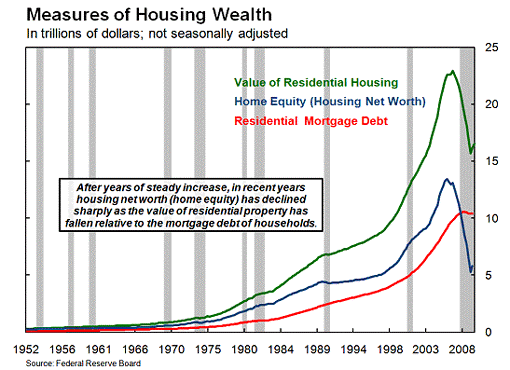
At the top of the housing bubble over $10 trillion in housing debt was owed on $24 trillion
in housing “value.” As of October 2009, according the Federal Reserve, housing "value"
declined to $16 trillion but households still owed more than $10 trillion on it.
In 2005 we forecast a 10 to 15 year mean reversion period, so we are nowhere near through the process. In my late 2007 Harper’s Magazine article “The Next Bubble” I forecast a $10 trillion loss in home value, considered outlandish at the time. A year ago we were already nearly there.
While households are still paying mortgages as if their homes were worth as much as during the bubble, and mortgage debtors owe more than their home is worth – they have negative equity – two key benefits of the inflated home price have vanished. One, the wealth effect of feeling richer by the amount of the home’s equity, and two, the ability to borrow against the value of the home.
The trillion dollar debt cut
Over the course of the housing bubble from 2002 to 2006, the amount that households spend just to pay the interest on mortgage debt grew from 15 cents to more than 22 cents of every dollar, starting from 6 cents before the FIRE Economy took off in 1980.
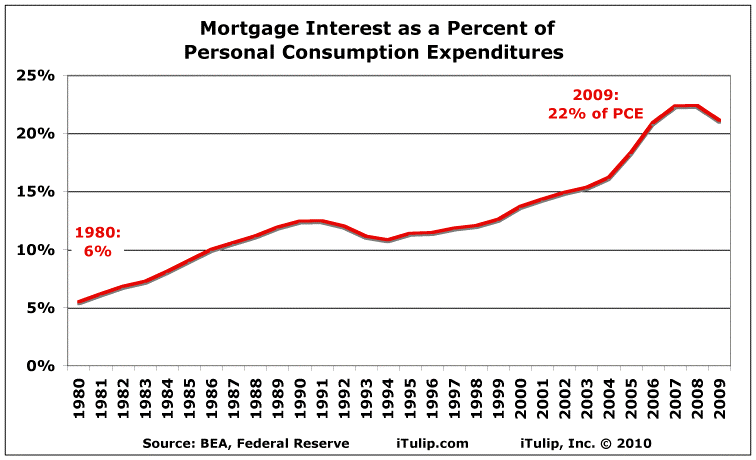
As of July 2010, personal consumption expenditures (PCE) for US households totaled
$10.3 trillion year to date. Of that $2.3 trillion of went just to pay just the interest, and
none of the principal, on mortgages.
If home values are permitted to decline another 20% to pre-bubble levels, and mortgages are written down to pre-bubble levels, US households will have approximately $1 trillion dollars more to spend annually.
Just imagine the kind of stimulus that will provide. It’s the equivalent of a $1 trillion per year tax cut, and without reducing pension liabilities, military spending, raising taxes on the rich or anyone else.
This is the debt overhang that is killing the US economy. It is owed to the politically protected banking industry by the increasingly politically impotent American voter. It is curiously framed as a left versus right issue, but the real battle is between creditors and borrowers, and between debtors and saver, and the interests that represent them.
The banking lobby has effectively engaging conservatives in the cause of securing their assets. They argue that debtors should be held responsible for bubble era debts. The mortgage debt is the responsibility of the borrower, they say. This is true, so far as the debtor is contractually on the hook to pay back the money. However, determining the creditworthiness of a borrower is always the lender’s responsibility. Capitalism can’t work otherwise. Anyone who thinks for five minutes about personal loans they have made to friends that were not repaid knows this. Whose fault was is that the loan to your brother-in-law was not paid back? Only your own. You should not have lent him the money, and you did not go looking for someone to blame.
That’s where the buck stops, with the lender. Mortgage lenders who cannot competently determine the creditworthiness of borrowers should go out of business, just the way the incompetent venture capital firms did after the technology stock bubble collapsed in 2000 to 2003. Thankfully, no VCs were bailed out by the government. Those that made poor investments were allowed to fail. Stock of companies in the portfolio that had value was sold to other investors at pennies on the dollar. The same principle applies to mortgage lenders. Sell the assets of the poorly run banks to the well-run banks. Too big to fail? Then let the Fed take them over and sell the assets off and write down the fictitious value over time. The process is not at all complicated.
Of course, the free market solution to the US balance sheet recession will not be allowed to happen. The banks don’t want to take a loss, and as long as they have as much political influence they do today, they won’t have too. Instead, we will continue to get this:
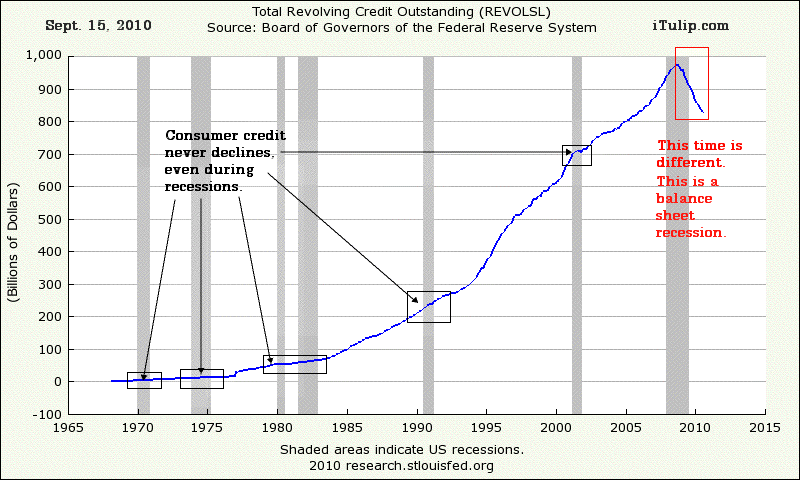
Private credit continues to contract debt overhang. Balance sheet recessions are not like other recessions.
As consumer credit outstanding continues to contract, a corresponding rise in government borrowing to compensate for the decrease in private sector borrowing is required to keep the money supply from imploding. If that happens the economy will enter a brief deflationary crisis before an extreme debt and currency crisis (referred to as a Ka-Poom process here on iTulip since 1999).
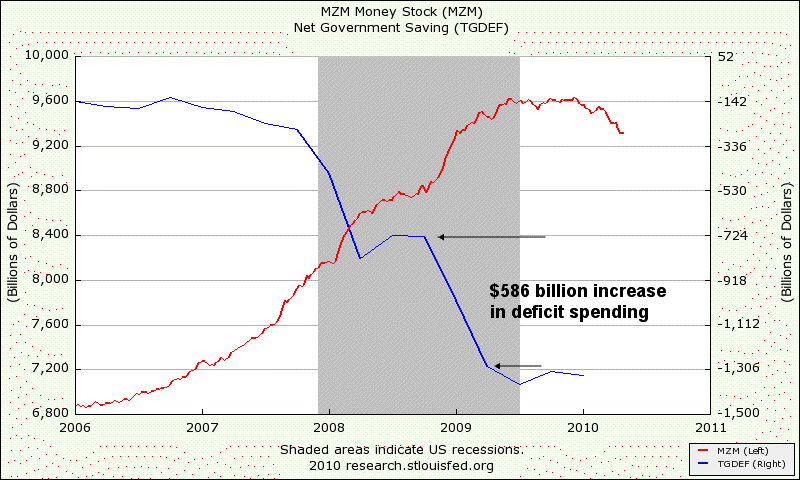
Government spending is expanded to borrow money into existence when the private
markets don’t. Let up on the spending, and down it goes as in 1938 in the US and in
Japan in 1996. Again, balance sheet recessions are not like other recessions.
Until the bubble era debt is written down to the lower prices of the homes in some orderly way, the US balance sheet recession will continue, and the fiscal deficit will continue to grow, until one of three following scenarios occurs.
A. The US runs out of credit, leading to a debt and dollar crisis, and self-reinforcing downward spiral of rising interest rates, economic contraction, a declining dollar, and rising inflation.
B. The second Peak Cheap Oil Cycle pushes the US back into recession, leading to A.
C. The financial oligarchy loses influence over bank reform legislation, the housing bubble era debt is written off, and the TECI Economy is developed as the FIRE Economy is phased out.
The reason why the gold price keeps climbing is that the probability of scenarios A or B is rising since the appointment of Summers, Rubin, and Geithner to head up economic and Treasury policy. With Obama’s recent nomination of sub-prime lending apostle and all around housing bubble cheerleader Austan Goolsbee chairman of the Council of Economic Advisers, the disastrous bailout of the FIRE Economy will continue. B. The second Peak Cheap Oil Cycle pushes the US back into recession, leading to A.
C. The financial oligarchy loses influence over bank reform legislation, the housing bubble era debt is written off, and the TECI Economy is developed as the FIRE Economy is phased out.
Investor Implications: We repeat the same position we took in our previous commentary on this topic.
For iTulip readers, the same hold position as we have had since September 2001 when we took a 15% gold allocation at $270.
If we didn't already have gold would we buy it today at this price?
Yes, but we would not be happy about it. Despite the fact that the value of the gold we bought in 2001 has increased more than four times since then, its role in our portfolio is not capital gains but insurance against a disorderly breakup of the current international monetary regime resulting in a sudden currency value dislocation and inflation. The gold price rise represents an increase in the FIRE Economy insurance premium. The fact that we paid a low premium is great, but the rising price means that the chances of a fire are increasing.
Evidence: Central banks last year for the first time in 20 years became net gold buyers. This indicates a serious breakdown in trust and confidence in the system among members of the central banking establishment. They do not like the direction that the United States is taking.
Central banks turn net gold buyers in 2009-CPM Grp
NEW YORK, April 27 (Reuters) - Central banks turned to buyers from sellers of gold for the first time in 20 years in 2009, driven by Chinese stockpiling and worries over global currencies, metals research and consultant CPM Group said on Tuesday.
NEW YORK, April 27 (Reuters) - Central banks turned to buyers from sellers of gold for the first time in 20 years in 2009, driven by Chinese stockpiling and worries over global currencies, metals research and consultant CPM Group said on Tuesday.
Get the word out. Embed this slide show on your site.
HTML Code:
[COLOR=#000000]Your browser doesn't support JavaScript or you have disabled JavaScript.[/COLOR]
See also:
Lessons of the American Lost Decade – Part I: The gold bugs were right
iTulip Select: The Investment Thesis for the Next Cycle™
__________________________________________________
For a concise, readable summary of iTulip concepts read Eric Janszen's September 2010 book The Postcatastrophe Economy: Rebuilding America and Avoiding the Next Bubble
 .
.To receive the iTulip Newsletter/Alerts, Join our FREE Email Mailing List
To join iTulip forum community FREE, click here for how to register.
Copyright © iTulip, Inc. 1998 - 2010 All Rights Reserved
All information provided "as is" for informational purposes only, not intended for trading purposes or advice. Nothing appearing on this website should be considered a recommendation to buy or to sell any security or related financial instrument. iTulip, Inc. is not liable for any informational errors, incompleteness, or delays, or for any actions taken in reliance on information contained herein. Full Disclaimer
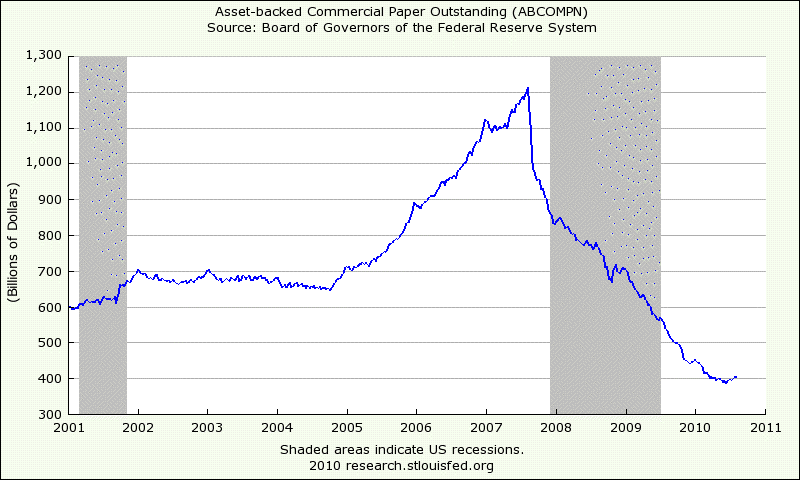
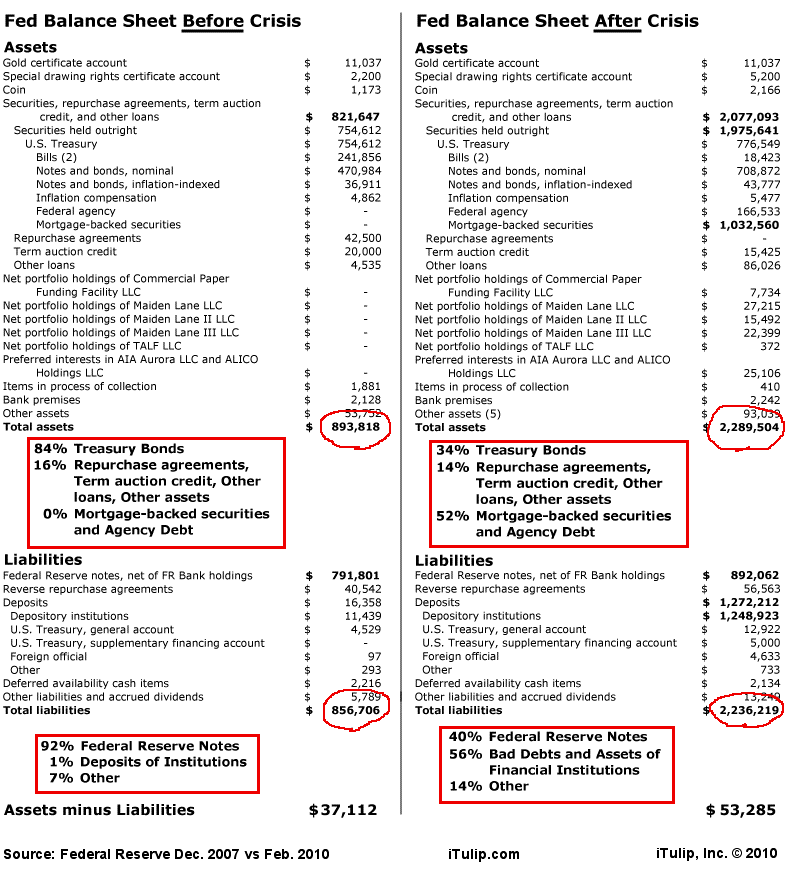
Comment